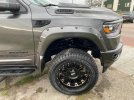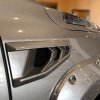..... What they are telling me is the rear window was not a recall so in so many words they're saying that the responsibility of a replacement rear window is mine....
This is technically accurate, but it's not that simple.
A recall will only be issued for safety concerns. A Technical Service Bulletin (TSB) will be issued for known problems which are not a safety concern. A TSB isn't required to be repaired, so many times they aren't checked or fixed unless the consumer reports the problem. Likewise, if not addressed during the warranty period, they are typically* up to you to fix and/or pay for. (
* more on this below)
This is unlike a recall which will have safety implications and thus it must be repaired regardless of model year or mileage. This is why they send things out in the mail urging you to have the vehicle inspected/repaired. This covers them against legal claims if the effect part fails and causes injury/death.
Don't confuse a "recalled" item with a known defect. They are two very different things. FCA dang well knows it's a common problem and they've got a TSB on it (now you have it too). However, a leaking window/roof does not pose a safety concern so there isn't a recall for it. That doesn't mean it's not a known defect.
With this being a known issue it makes it extremely difficult for FCA to claim you have a flooding problem that you caused. They know there's a potential for the leak resulting from a manufacturer defect and they're actively repairing that very issue on your truck.
This defect is known to cause the rear seat area to accumulate water/moisture. This also happens to be where the etorque battery is located. Water is obviously bad for electronics. Therefore the logical and reasonable person would conclude that the defect has cause the failure of the etorque system.
So what about that warranty. Obviously the leak is outside the 3 year/36K mile warranty. That sucks so you may not have much of an argument there. However, a vehicle warranty guarantees (or "warrants") that the part is free from defects related to the manufacture or craftsmanship of the vehicle/part. In this case, a manufactured or assembly issue has caused water incursion and the subsequent failure of the part. I would argue that the etorque, which is still under warranty, failed due to a manufacture/craftsmanship defect. In which case it should be covered by the warranty on that part.
If this leak is a known issue, then shouldn't the etorque system be shielded from the potential risk of water exposure? That's not on you. You didn't alter the vehicle, drive through deep water, or somehow create damage to the covered part. It's a manufacturer defect plain and simple.
Great information shots! Much appreciated..I copied all of it and will have a little intelligence to bring because of you and all of the support I get here at 5th gen..Thanks so much again!!
You're welcome. Remember to remain level headed. More flies with honey and all that jazz.
Another arrow for your quiver.
Although it is commonly associated with aftermarket parts, you may want to read up on the Magnuson-Moss Warranty Act. Fair warning it's a long read. I recommend taking notes while you do it, there's a lot to unpack, but it's worth it.
One thing that may be relevant to your claim is that, the coverage is valid even where written warranty has already expired as long as
the defects appeared during warranty period. Which means, even though the warranty period has expired, the leak may still be covered if there is evidence that it had been leaking for long enough that it was leaking when the warranty was in force. Signs of this would be mold, decayed carpet/seat cushions, heavily rusted fasteners in the affected area, etc.
The other, and probably bigger thing, that this act covers is that the manufacturer can't deny coverage on a part that is currently under warranty without
evidence that it wasn't a defect. If they are claiming "flood damage" what evidence is there of being flooded? Obviously there is water damage, as a result of the leak. However that leak has already been established as a known manufacturer defect. By claiming flood damage that you're responsible for would imply that you drove into high water, or maybe left the windows down during heavy rains. Is there any evidence to support that allegation? Are there water marks on other interior components away from the affected area? I don't think they can deny coverage if they are unable support their claim that you (or the prior owner) caused the damage.
Although I'm not a lawyer so maybe I'm reading to much into it.
 )So I just got a call today from service and he said there gonna "try" to get me outa there at $1000...... I already paid $350 for a new 12 volt battery..so it'll be $1350..the service manager is a great guy I know hes a friend of mine trying every possible thing to bail me out of this mess..Its the manufacturer that pulling the rug out from underneath me...I'm not at the part where they hand me a bill yet but I've got a case # with Ramcares but I was already told by a case worker i don't have a case because i am the second owner idk...i wish i could just win publishers clearing house and non of this would matter lol!
)So I just got a call today from service and he said there gonna "try" to get me outa there at $1000...... I already paid $350 for a new 12 volt battery..so it'll be $1350..the service manager is a great guy I know hes a friend of mine trying every possible thing to bail me out of this mess..Its the manufacturer that pulling the rug out from underneath me...I'm not at the part where they hand me a bill yet but I've got a case # with Ramcares but I was already told by a case worker i don't have a case because i am the second owner idk...i wish i could just win publishers clearing house and non of this would matter lol!













